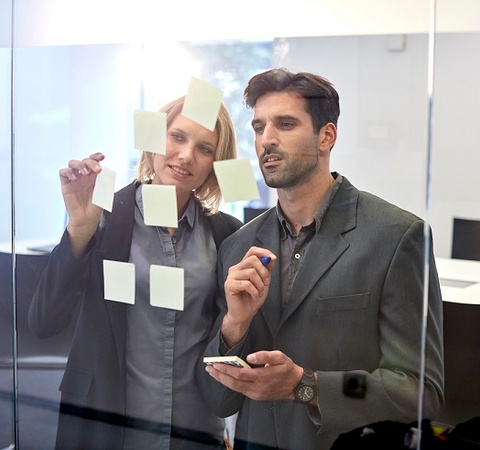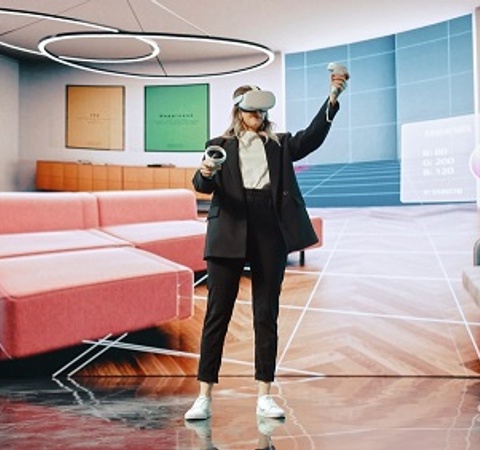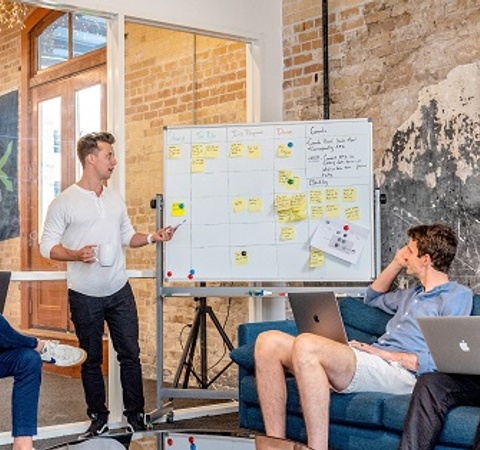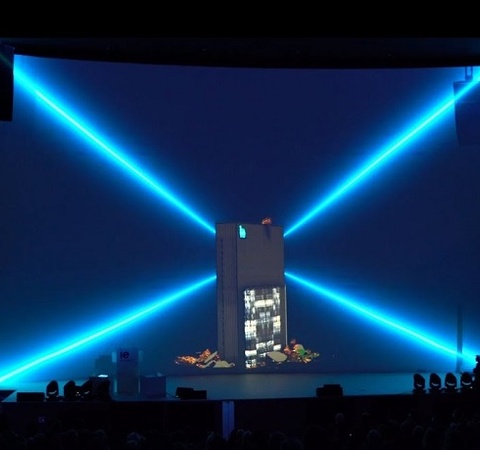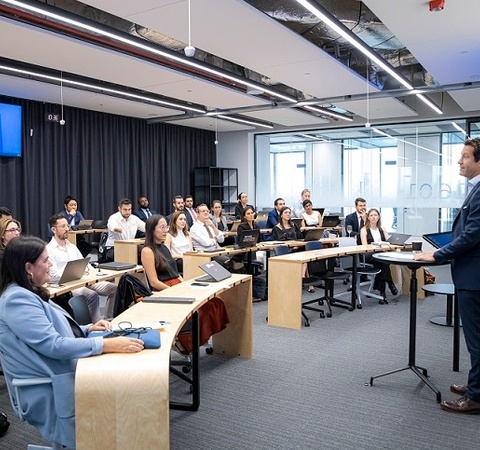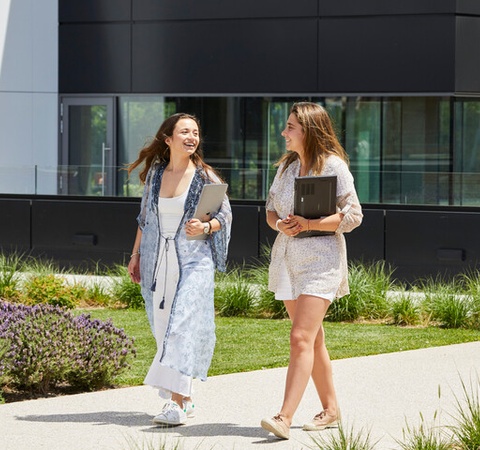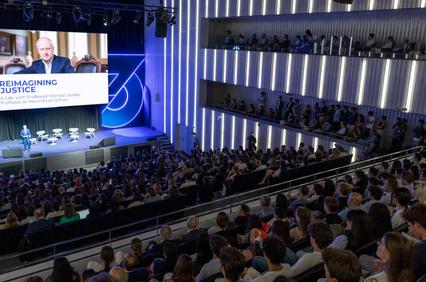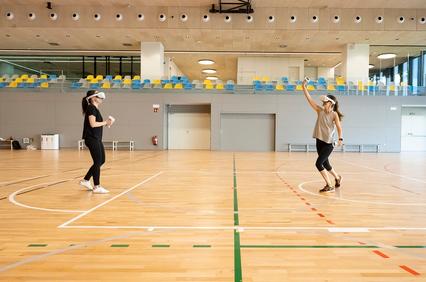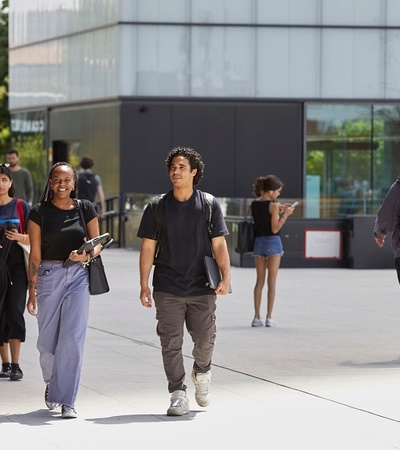
Dive into the experience
Dive into the experience
- Home
- Dive Into The Experience
MATERIALIZING LIQUID LEARNING
MATERIALIZING LIQUID LEARNING
METHODOLOGIES
METHODOLOGIES
A key element of our Liquid Learning philosophy is the constant rethinking of learning methodologies and activities. By exploring new methods and strategies, we can stay current and adapt to the changing needs of students and the job market. It also helps to foster innovation and creativity, making learning more engaging and enjoyable for both students and faculty. With this in mind, we consistently identify, experiment with, and implement new pedagogies in the areas of:
Asynchronous Learning
Project-based Learning
Team-based Learning
Immersive Learning
AI for Learning
Feedback Formats

IE Edge Lab
IE Edge Lab
To all the innovators: Welcome to the IE Edge Lab. This is where you explore new ways to teach and learn. Where you experiment. A place to collaborate freely, to experiment without fear. The IE Edge Lab is a space where forward-thinkers can try new ideas, fail, succeed, learn, fail again. This is where practitioners, students, and professors come together to effect real change in higher education.
The IE Edge Lab’s process cuts down to four simple steps. First, you propose your experiment. Second, you collaborate for others’ insights. Third, you put your ideas to the test. Fourth, you share your discoveries. And finally—you inspire further innovation and the process starts all over again.
Can you be a catalyst for change? The IE Edge Lab is where we connect
Materials
Materials
In order to support the implementation of these innovative methodologies and activities, we must provide professors with equally cutting-edge learning materials, some even created using ChatGPT and other generative AI technologies. These learning materials ensure an enriching and active experience for all students.
- Case studies & exercises
- Interactive tutorials
- Multimedia cases & videos
- Pre-programs
- Simulations & games
- VR/XR materials
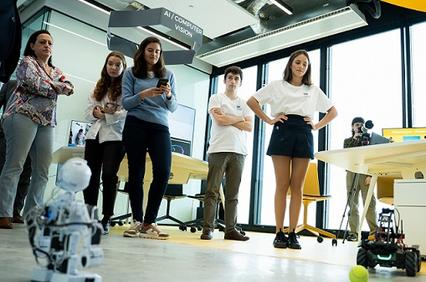
Competencies
Competencies
Through our Liquid Learning approach to education, our students gain solid impact skills and competencies that prepare them to excel in the modern world of work. Impact means making big things happen – at work and beyond. Having real impact comes down to who students are, how they think, and how they behave in real situations, with real people, in the real world. Transforming yourself is hard work, but if you’re open to change and new mindsets, you'll make it happen with the help of classmates and professors.
This type of timeless skill set positions students to succeed in any role and any sector, regardless of the inevitable shifts and changes they undergo.
These impact skills include, but are not limited to:
These impact skills include, but are not limited to:
- Problem solving
- Critical thinking
- Creative thinking
- Project management
- Teamwork
- Storytelling
- Digital fluency
TOMORROW’S LEARNING TECHNOLOGIES
TOMORROW’S LEARNING TECHNOLOGIES
It goes without saying that technology has the potential to greatly enhance the educational experience for both students and faculty. It provides access to vast amounts of information, facilitates communication and collaboration, and creates engaging and interactive learning experiences. What’s more, technologies such as VR, AR, and AI provide novel ways to personalize education and provide feedback.
To this end, we explore and invest in emerging technologies in the following areas, among others:
- 01.
EDTECH TOOLS
In order to increase the use of asynchronous learning, we rely on technological tools such as Feedback Fruits, Miro, and Trello, among others.
- 02.
LEARNING ANALYTICS
We use cutting-edge learning analytics to gain insights into each student’s unique educational journey. For example, we can identify which students need extra support in specific areas, we can see which activities have the highest level of learning impact, we can closely measure engagement, and so much more.
- 03.
IMMERSIVE LEARNING
We increasingly integrate the use of extended reality (XR) and the Metaverse into our programs. Discover more about Inmersive learning here.
- 04.
FEEDBACK TOOLS
In order to give and receive quality feedback in large classes – a growing need for educators – we use innovative, personalized feedback tools such as AI-supported integrations in our platforms for our “augmented professors.”
AI FOR EDUCATION
AI FOR EDUCATION
AI technologies are taking the world by storm, leaving no leaf unturned in the evolving educational landscape. As a result, the learning experience we provide must transform to meet the new needs and expectations of both students and their future employers.
This transformation is multifaceted, calling for integral AI-powered changes across many areas. First, we should use AI tools to customize and tailor the learning experience to each student’s personal needs and learning styles. Next, we must radically change our teaching methodologies in order to ensure they equip students with the right competencies and mindsets for the future. Finally, educators should take advantage of AI tools internally, using them to better assess students’ performance and provide thorough feedback.
At IE University, we’re spearheading this change. Teams of academics and pedagogists from our institution are constantly working to adapt programs, curriculums, and formats to the latest developments in AI. We are analyzing the impact of AI on the job market and designing new content and materials that respond to that impact. Most importantly, we’re developing top-tier training programs for our faculty, so that they understand how to best harness the power of AI to enhance the learning experience.
EMPOWERING EDUCATORS, ELEVATING EDUCATION
We believe it is crucial that our faculty be equipped with the right knowledge, skills, and tools to provide the best possible education for students. To that end, our professors are constantly upskilling and reskilling to stay up to date with the most cutting-edge AI technologies. This way, they have the insights to adapt their teaching approach and select the best tools to use in the classroom. Empowered by these tools, our educators are able to reach their maximum potential, providing students with 24/7 guidance and hyper-customized learning.
AN AI-ENHANCED HUMAN EXPERIENCE
At IE University, we embrace the potential of AI, because we believe that we can and should work hand in hand with it to improve our lives. Far from replacing us, AI’s power lies in its ability to complete the more mechanical, automatable tasks, allowing people to focus on the irreplaceable, authentically human work. Simply put, it makes the human experience better, enhancing not only the way we teach and learn, but how we create, collaborate, and connect. We can use AI to foster innovation, strengthen our critical-thinking skills, and inspire intellectual curiosity – and at IE University, we’re doing just that.

Embracing Artificial Intelligence
Embracing Artificial Intelligence
Artificial Intelligence is here for good. As it transforms our lives in ways we never thought possible, it’s crucial to define its role in higher education. And we’re taking the lead.
The mission? To fuse AI with every cross hair of our DNA. Through an ongoing technological immersion, the IE Community is submerging itself in forward-thinking ethics, AI-driven practices and cutting-edge conversations around innovation in learning.
You’ll feel this in every IE space and experience. Our culture puts humans front and center amidst technological revolutions. We believe AI is a spark for progress—and our people will always be the primer and catalyst.
HOW DO OUR EDUCATORS SEE THE USE OF AI?
HOW DO OUR EDUCATORS SEE THE USE OF AI?
AI for Education | AI as a Learning and Productivity Tool
AI for Education | Using AI Critically in the Classroom
AI for Education | Introduction to AI in the Creative Process
CAMPUSES IN THE ERA OF LIQUID LEARNING
CAMPUSES IN THE ERA OF LIQUID LEARNING
With the rise of remote work and online learning, the role that campuses play in society has evolved rapidly. By rethinking that role and embracing practices like the ones below, institutions can continue to provide valuable learning experiences and prepare students for the challenges and opportunities of the future.

Embrace a
hybrid model
Campuses can continue to serve as physical hubs for learning and collaboration, but they should also incorporate online learning platforms and other digital tools to offer students and faculty increased flexibility and convenience.

Prioritize
community
building
Campuses should continue to foster a sense of community among students, faculty, and staff. At IE University, we do this through initiatives like mentorship programs, student organizations, and campus-wide events.
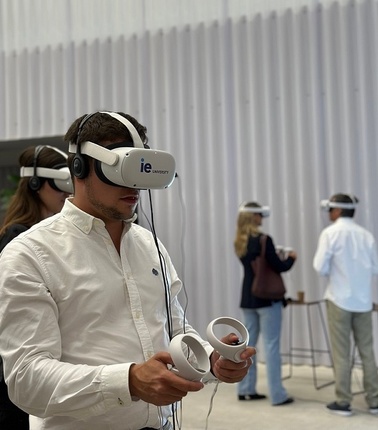

Focus on
experiential
learning
We strive to offer a wide range of opportunities for experiential learning, such as internships, research projects, and service learning. These opportunities can help students gain real-world experience and develop practical skills that will prepare them for the workforce.

Foster
innovation
Campuses should serve as hubs of innovation where students, faculty, and researchers can collaborate to develop new ideas and technologies. We make this idea a reality through entrepreneurship programs, innovation labs, hackathons, and more.
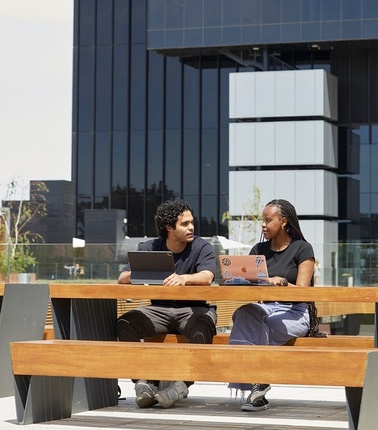

Promote
sustainability
Physical campuses should prioritize sustainability and environmental protection. At IE University, we do this by embracing initiatives such as green buildings, renewable energy, and waste reduction programs, among others.

Embrace
diversity
and inclusion
Campuses should be welcoming and inclusive environments for all students, regardless of their race, gender, or background. We strive to ensure this through diversity and inclusion training, multicultural centers, and groups for underrepresented students, among other initiatives.

Build an
international
network
To be truly liquid, universities should make a concerted effort to forge connections with their community members who are based around the world. That’s why at IE University, we have 30 international offices where our students and alumni can come together and network.
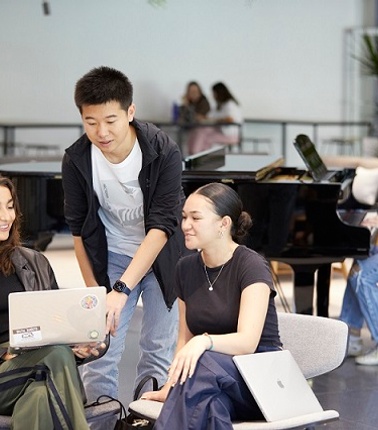
LIQUID PROGRAMS
LIQUID PROGRAMS
Liquid Learning touches every aspect of educational activity at IE University, including the design of programs themselves. It’s not just that within the programs you’ll find liquid technologies, methodologies, and more, but that the programs themselves are set up in a way that responds to the needs of students and the disruption of the educational ecosystem.
This entails changes in the length of programs, how they’re structured, the modules they include, and more. We aim to provide students with greater flexibility and the ability to explore and specialize. Rather than choosing a path and sticking to it, learners should have the freedom to upskill, reskill, and pivot – for an experience that’s truly liquid.
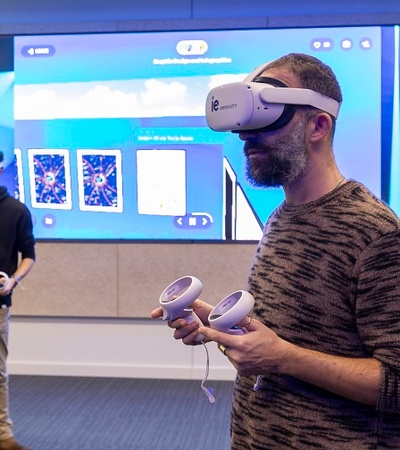
OUTSIDE THE CLASSROOM…
OUTSIDE THE CLASSROOM…
Our Liquid Learning philosophy is present in everything we do at IE University – far beyond the realm of academia. It’s crucial to us that we provide our active community with a 360-experience, chock-full of extracurricular activities, events, clubs, sports teams, and more organized across our virtual, in-person, and hybrid spaces. Because life is liquid.
ACTIVITIES & EVENTS
Now more than ever, human connection is hybrid. We Facetime our family, we schedule in-person meetings on virtual calendars, we Whatsapp our friends, we attend blended workshops… So why shouldn’t university campuses be the same? We offer our students hundreds of activities and events per year – distributed across many locations and formats. We embrace innovation in every aspect of life, including the social and cultural.
SPORTS & WELL-BEING
We’re seeing a growing emphasis on work-life balance and physical and mental well-being, and advances in technology are aiding this shift. In a given day at IE University, you might attend an online course, do a physical yoga class with the professor tuning in from another city, take a stroll through campus while monitoring your heart rate, and then meet up to play soccer with a group of people you connected with on a forum. We believe in embracing innovation to improve our lives, and sports and well-being are no exception.
LIQUID ALLIANCES
LIQUID ALLIANCES
In the higher education sector, collaboration is key to knowledge sharing and progress. That’s why we’ve formed public and private partnerships with international organizations and corporate players, as well as with other top academic institutions. These collaborations allow us to keep our finger on the pulse of the latest trends in learning innovation.
